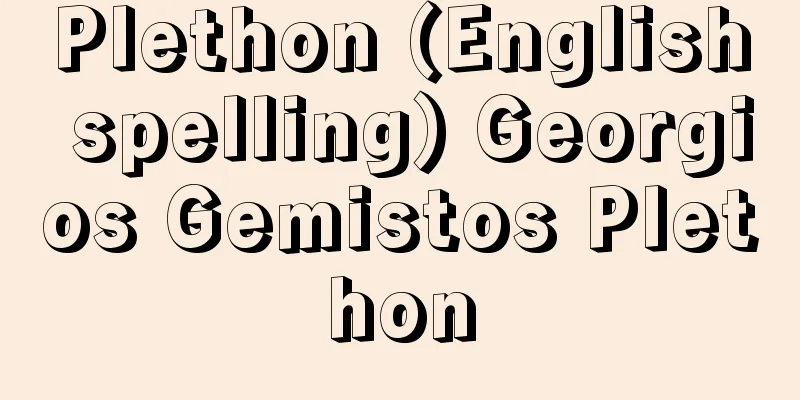Plethon (English spelling) Georgios Gemistos Plethon

|
A humanist in the Byzantine Empire. He came of age and completed his education in the capital, Constantinople. He went to Mystras in the Peloponnese, where he established a school for teaching Platonic philosophy under the patronage of the local ruler, Theodore II. His students included many humanists, including the future Cardinal Bessarion. Although he opposed the unification of the Eastern and Western Churches, he attended the Council of Ferrara and Florence (1438-1439) as a member of the retinue of Pope John VIII (reigned 1425-1448). He aroused interest in Platonic philosophy among Italian humanists, and at the same time created a conflict with Aristotelian philosophy, which had been the mainstream until then. This was also the impetus for the founding of the Platonic Academy (1462) by Cosimo de' Medici, who later became the head of the Medici family. His main work, Laws, only fragments remain because it was banned by his opponent Gennadius (c. 1400-1468) (the first patriarch after the fall of the capital), but he advocated a return to classical Greece and the introduction of Julian-style paganism. From the same perspective, he aspired to the restoration of the empire with Mystras at its center. He submitted petitions to both Theodore II and Emperor Manuel II, urging them to realize these proposals. His utopian proposals included a shift from Christianity to polytheism, tax reform, training of national soldiers to replace foreigners, a three-tiered social hierarchy based on Plato's Politeia (peasants, merchants/craftsmen, and soldiers/officials), the deprivation of monks of economic power, and an equal division of land, but these proposals were never realized due to his death and the subsequent collapse of the empire. [Hiroshi Wada January 20, 2015] [Reference] |Source: Shogakukan Encyclopedia Nipponica About Encyclopedia Nipponica Information | Legend |
|
ビザンティン帝国の人文主義者。首都コンスタンティノープルで成人し、教育を修めた。ペロポネソスのミストラに赴き、この地の領主テオドロス2世の庇護(ひご)の下にプラトン哲学を講ずる学校を主催した。弟子には後の枢機卿(すうききょう)ベッサリオンを筆頭に多くの人文主義者が輩出した。東西両教会の統一に反対の立場ながらフェッラーラ・フィレンツェ公会議(1438~1439)にヨハネス8世Johannes Ⅷ(在位1425~1448)の随員として列席し、イタリアの人文主義者たちにプラトン哲学への興味を呼び起こし、同時に従来の主流であったアリストテレス哲学との対立を生んだ。後のメディチ家のコジモによるプラトン・アカデミアの創設(1462)もこれを契機としている。主著『法律』は、論敵ゲナディオスGennadius(1400ころ―1468)(首都陥落後の初代総主教)の断により禁書とされたため断片しか現存していないが、古典ギリシアへの回帰とユリアヌス流の異教の導入を説いた。同じ立場から、ミストラを中心にした帝国の復興を志した。彼は、テオドロス2世と皇帝マヌエル2世にそれぞれ建白書を提出、その実現を促した。すなわち、キリスト教から多神教への転換、税制の改革、外国人にかわる自国兵の養成、プラトンの『ポリテイア』によった社会層の三分化(農民、商人・職人、軍人・役人の三層)、修道士のもつ経済力の剥奪(はくだつ)、土地の平均的分割などを内容とするユートピア的提案も、彼の死とそれに続く帝国の崩壊により、その実現をみることなく終わった。 [和田 廣 2015年1月20日] [参照項目] |出典 小学館 日本大百科全書(ニッポニカ)日本大百科全書(ニッポニカ)について 情報 | 凡例 |
>>: Pretoria - Pretoria (English spelling)
Recommend
Palythoa tuberculosa (English spelling)
...The polyps in the colony are a mixture of asex...
Full layer fertilization - Zensousehi
Fertilization is the application of nitrogen ferti...
Camping car - Camping car
A Japanese term for a vehicle equipped with campi...
Economics - Keigaku
Chinese Classical Studies. In China, the study of...
Alexias
…Daughter of the Byzantine Emperor Alexios I Komn...
Meritocracy Management
The Japan Federation of Employers' Association...
Ibn Rustam
…The capital was Tahult. The Persian Ibn Rustam (...
Trease, H.
…Adventure novels also developed through J. Masef...
Real rights claim - real rights claim
When a person with a real right is hindered or is...
Ferde (Ferdinand Rudolph von) Grofé
American composer and arranger. Born in New York....
Asai Erin
…In 1930, when Taipei Imperial University was est...
Fauni
…Fauna, the goddess who has the same function as ...
aldose
...A general term for polyhydric alcohols with al...
Wakamiya
〘 noun 〙① A young prince. Also, generally, a child...
The beautiful Mount Asama
Kabuki. Historical piece. Three acts. Said to be t...









